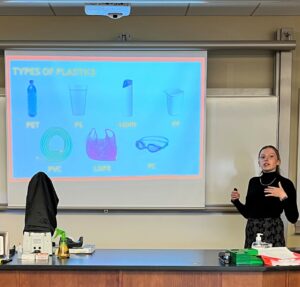GREENEVILLE – The Southern Association of Colleges and Schools Commission on Colleges has reaffirmed Tusculum University’s accreditation through 2030 with no conditions, providing further momentum for the higher education institution’s initiatives.

Lorrice Tomer-White presents her senior seminar project in the state-of-the-art Meen Center.
Tusculum has been accredited by SACSCOC since 1926.
“We are thankful for SACSCOC’S confidence in our university,” said Dr. Scott Hummel, Tusculum’s president. “Reaffirmation is a rigorous and detailed peer-review process that enables SACSCOC to evaluate us and other higher education institutions thoroughly. We welcome this process, as it provides another way for us to ensure we have the appropriate programs and systems in place to serve our students effectively.”
Dr. Hummel praised the extensive work of the Executive Cabinet, deans, academic departments and administrative offices that participated in the reaffirmation process. He said Dr. Tricia Hunsader, provost and vice president of academic affairs, was stellar and focused as she led the university’s preparation for the SACSCOC review. He also commended Benita Bare, vice president of finance and chief financial officer, for her guidance.
Even though the university has received reaffirmation, Dr. Hummel said Tusculum will not rest on its laurels. He said Tusculum will remain engaged in a continuous process to ensure it is serving students with the academic programs, extracurricular activities, social events and spiritual nourishment opportunities that will help them during their studies at Tennessee’s first higher education institution.
Tusculum enjoys many strengths, including abundant opportunities for undergraduate students to participate in research that will prepare them to be career-ready professionals. Five Tusculum students were selected this year to perform stipend-funded research during the summer as Ledford Scholars of the Appalachian College Association. Other students have participated in Tusculum’s Academic Symposium, and seniors have presented their seminar and capstone projects.
The university offers more than 60 majors and minors and extensively increased academic offerings in 2021. Additional programs of study will be coming in fall 2023. Multiple master’s programs are also available.

Students Lexie Vesser, left, and Ben Gall play air hockey in The Pioneer Perk, the student lounge.
Tusculum’s commitment to its students has resulted in the startup in 2021 of a health clinic on campus in partnership with Ballad Health and this year’s opening of a wellness center and a student lounge for relaxation. Spiritually, the university has added weekly voluntary chapel sessions and hired a campus minister to assist students, faculty and staff.
The university is focused on achieving its mission, and students, faculty and staff are regularly engaged civically through academic and service work in the community. Tusculum continues to provide a robust arts program to the community, with further growth anticipated in the university’s Center for the Arts. A recent review by the university revealed a $58.3 million annual economic impact by Tusculum on the region.
“We are pleased to serve students from local communities and other parts of Tennessee, the nation and the globe with a pioneering spirit in a caring Christian environment,” Dr. Hunsader said. “When students choose Tusculum for their degree, they receive one-on-one attention and mentorship from their professors and valuable support from our dedicated staff. We are focused on helping students succeed in all facets of their lives and are grateful they entrust us to meet their needs.”
To learn more about the university, please visit www.tusculum.edu.


